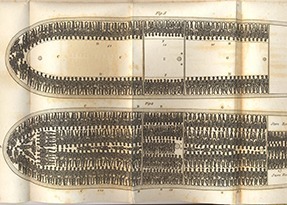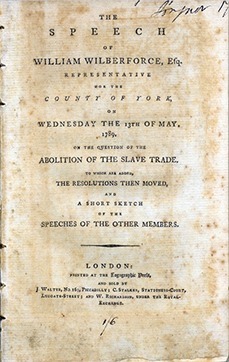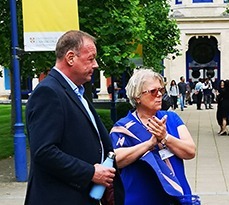A research symposium on human trafficking, co-ordinated with the Cambridge Centre for Social Innovation, looks at refugees, recruitment, routes and other troublesome “Rs” of modern slavery.
Winding their way up an ornate iron spiral staircase, delegates to a special symposium emerge on the upper floor of the Old Library (dating from 1624) at St John’s College, Cambridge, to view some priceless but disturbing documents.

There is a list from 1797 (with names, ages and prices) of slaves to be bought for a Jamaican sugar plantation; a detailed drawing of a slave ship’s interior, showing the inhumanly crowded conditions; and correspondence from leading anti-slavery campaigners William Wilberforce and Thomas Clarkson.
The documents that were on display for the conference are all housed in the Library’s Special Collections – a reminder of the horrors of the slave trade and the people who helped abolish it in Britain in 1807.
The pilgrimage to view the special collection on slavery came on the fifth and final day of the fourth Summer Symposium of the Cambridge Centre for Applied Research in Human Trafficking (CCARHT) – the first to be held in collaboration with the Cambridge Centre for Social Innovation at Cambridge Judge Business School, and the Centre for the Study of Global Human Movement.

Both images reproduced by permission of the Master and Fellows of St John’s College, Cambridge.
Most of the 1-5 July sessions were held at lecture theatres at Cambridge Judge.
“The theme of this year’s Symposium was the ‘Several Rs of Trafficking: its Risks and Rewards’”, said Dr Carrie Pemberton Ford, Executive Director of CCARHT. “The details of contemporary human trafficking are in most instances different from that depicted in the slavery documents we saw from the late 18th Century, but brutal nonetheless. Human trafficking is a hugely lucrative criminal activity and referencing the activity as modern slavery reminds us of the massive violation of global human rights it represents.”
The “Rs” of trafficking explored at the Symposium included the millions of global Refugees and the Risks they faced of being exploited and trafficked without access to citizenship and employment Rights; Routes deployed by traffickers; Reporting systems; Recruitment of trafficking victims; Research gaps surrounding trafficking; and – just before the library visit – a look at the Removal of organs for profit, taken from people desperate for money, who “donate” kidneys and other organs and “bodily products” in a world where these precious “goods” are at a premium.
Video of organ “harvesting” discussions secretly recorded at hospitals and other settings by a Romanian filmmaker were arguably “the most chilling aspects of the week”, says Dr Pemberton Ford.
Attendees at this year’s Summer Symposium included about 80 people from 20 countries. Delegates included scholars, policymakers, lawyers, health professionals and counter-trafficking campaigners.
Simon Stockley, Senior Faculty in Management Practice at Cambridge Judge Business School, set the tone for the week’s discussion in an opening presentation that made two key points: traffickers often function as “arbitrageurs” in that they exploit gaps caused by different levels of enforcement and economic systems between nations and regions; and whilst human trafficking needs to be combated on a daily basis, the long-term solution lies in narrowing the global inequality gap.

“Ending human trafficking is more than simply about chasing criminals, as important as that may be,” says Simon. “We really need to focus on inequality and the fundamental ruptures of social and employment rights that leads to trafficking.”
Among other sessions at the Summer Symposium, delegates explored ways to combat “Lover Boy” recruitment of vulnerable teenage girls that can lead to profound psychological abuse alongside the physical harms of sex trafficking, and delegates also heard from experts in Italy and Austria about their various experiences of dealing with refugees from Africa and the Middle East in recent years, including addressing the plight of millions of stateless people.
“With modern technology, there are things we can do to identify people without citizenship papers so they can demonstrate their work and educational history as they move around,” says Dr Pemberton Ford. “We heard that blockchain has the potential to provide an alternative route, effectively bypassing the political challenges and ‘social identity’ restrictions of nation-state concerns, to document someone’s experience, and liberate them into active economic participation and agency.”
The Director of the Cambridge Centre for Social Innovation, Dr Neil Stott, said his research centre was delighted to collaborate with and physically host this year’s CCARHT Summer Symposium, and looks forward to working with CCARHT in future events.
“Human trafficking results from a breakdown of various elements of civil society,” said Neil. “We believe that social innovation can help address some of the world’s ‘wicked problems’ – poverty, injustice and lack of access to basic human needs – that lead to trafficking, so we’re glad to play our part in finding a solution.”
Next year’s CCARHT Symposium on 29 June–3 July 2020 will explore the interconnection between the Sustainable Development Goals and Human Trafficking and Modern Day Slavery.


